28 October, Kigali, Rwanda, the Global Green Growth Institute(GGGI) in collaboration with the Government of Rwanda (GoR), through the Ministry of Infrastructure, Rwanda Utilities Regulatory Authority (RURA), and the City of Kigali hosted the hybrid workshop for training of trainers on electric bus system modeling and optimization to build capacity and share lessons learned in the adoption of election buses and transition to e-mobility. With more than 60 online participants the workshop was a fruitful learning experience for all the participants with the objectives being met it was an opportunity :
1. To present to bus operators an update on the national e-mobility strategy, incentives for transitioning to e-mobility, and current tariffs for electric vehicle charging ,
2. To provide information about the financial implications of transitioning to electric buses for City of Kigali and inter-city bus service operators ,
3. To connect bus companies with the capital needed to purchase electric buses to companies with an interest in entering the Rwandan market ,
4. To inform the private sector and investors about possible financing mechanisms to transition bus fleets to electric models.
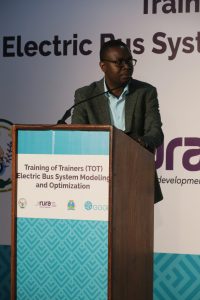
The Government of Rwanda has prioritized the transition to e-mobility for the purposes of reducing air pollution and greenhouse gas emissions and improving the wellbeing of its citizens, thus contributing to achieving the national and global goals. The promotion of mass rapid transportation is a component of Rwanda’s NDC targets for transportation. Transport contributes 13% of GHG emissions according to the national GHG inventory data. Population increases in urban centers are expected to increase the demand for services including public transport. As city centers become more populated, the need for high capacity, efficient modes of transport become more urgent in order to reduce GHG emission and air pollution sourced from vehicular emissions. Vehicular emissions are currently the leading cause of increasing air pollution in cities in Rwanda. Initiatives in the City of Kigali will lead the country in transitioning to green transport to reduce air pollution from vehicle exhaust as well as greenhouse gases (GHG) from the transport sector. By shifting more people to public transport, cities have the capacity to reduce road congestion, air pollution, and GHG emissions. The electrification of public transport further increases the potential for reducing the negative impact of transport on the environment and public health outcomes.
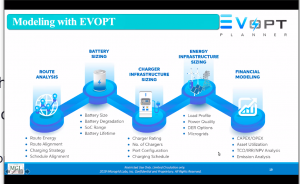
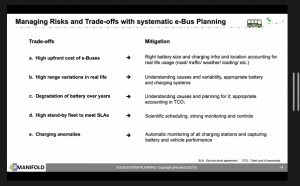
The training of trainers included large-scale bus fleet operators in Rwanda that have an interest in transitioning to electric vehicles, and the Head of Strategy for the Development Bank of Rwanda (BRD) to discuss financing options.
E-mobility represents an opportunity for the Government of Rwanda to address two areas of increasing concern:
1) rising levels of particulate matter (and GHG emissions) due to transport in fast-growing urban and peri-urban areas and
2) a surplus of electricity due to the country’s large-scale investments in hydropower.
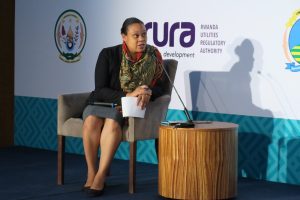
As a result, the commitment to phasing out the use of fossil fuels for transportation has been voiced from the highest levels of Government of announcing the planned development of a national e-mobility policy and plans to prioritize the transition to e-mobility starting with motorcycles, then buses, and lastly, cars and privately-owned vehicles. The Training of Trainers (ToT) workshop was able to introduce bus operators and inter-city transport companies alike with the tools and training needed to plan for and strategize their operations to enable the transition to electric buses. The training of trainers was designed to engage bus operators in the City of Kigali and companies operating on inter-city bus routes in the adoption and phased transition to electric buses. As part of the Stakeholder Coordination Framework for Promotion of E-mobility in City of Kigali, the event conveners aim to extend skills developed by the national government in electric bus system modelling and optimization to the technical staff persons and operations units within the bus companies responsible for public transport in the City of Kigali. The event utilized the resources of key technical staff of the Ministry of Infrastructure and City of Kigali to develop capacity in the private sector needed to plan for the phased introduction of electric buses, route selection, charging infrastructure options, and initial calculations for the Total Cost of Ownership (TCO) that will enable operations to transition their fleet to electric bus models.
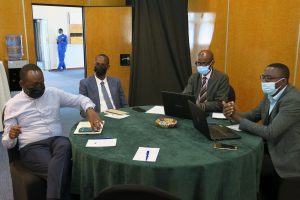
The training of trainers included an introduction and overview of the completed studies and national guidelines being developed to guide the transition to e-mobility. In addition case studies from other countries where the introduction of electric buses has been underway. The workshop provided an introduction to the electric bus system modeling and optimization tool, EVOPT, and provided participants with an understanding of the data that are required to impute into the software. Furthermore the workshop featured presentations from marketing information from bus and mini-bus manufacturers, and a presentation on financing mechanisms. The afternoon session will include practical information about bus types suitable to Kigali as well as conditions of financing schemes that would be applicable to bus operators transitioning to e-mobility.
Mr Janvier Twagirimana, Transport External Link & Donor Coordinator, at the Ministry of Infrastructure gave a comprehensive orientation of Rwanda’s National E-mobility Strategy , he gave context into the e-mobility feasibility study , the approved incentives and analytical works around electric vehicles. He said that “the transport sector in Rwanda is rapidly growing and much dependent on imported fossil fuel , and internal combustion engine (ICE) vehicles have negative environmental impact such as air pollution hazardous to health ;noise pollution ;emission of greenhouse gases that accelerate climate change. The overdependence on fossil fuel has a strong effect on the trade balance and therefore the solution to adress all these challenges would be to introduce electric vehicles.”
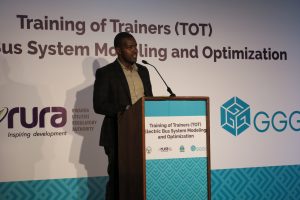
The Government of Rwanda has committed to transitioning to electric vehicles of all times. While the private sector has taken the lead on the introduction, integration, and adoption of electric motorcycles and cars in Rwanda, fewer opportunities exist for similar initiatives to import and transition to electric buses. As a result, public transport systems and bus fleets have little incentive to commit the high capital expenditure and cost of charging infrastructure to enable the shift to low-carbon and zero emission bus systems. Nonetheless, electric buses are an important component that will enable Rwanda to transition to a low-carbon, multi-modal transport system. Public transport services in Rwanda shift towards electrification and efficiency, leading to reduced transport-sector GHG emissions, green jobs creation, and improved provision of transport services and cleaner air.
Thereafter an introduction to electric bus with a demonstration Project Case Study with examples of E-bus Adoption and Integration was made by Changsun Jang, Transport and Sustainable Mobility Lead at GGGI in Seoul. Followed by a presentaion done by Francois Zirikana, E-mobility Specialist at the City of Kigali elaborating on the TCO Analysis Using EVOPT using City of Kigali data. The training also included an interactive panel discussion on “Electric Full-Size Bus, Mini-bus, and Charging Infrastructure Technology Selection for City of Kigali and Inter-city Routes ” with panelists Rahul Bagdia, Managing Director, PManifold ; Wim Elshout, ABB E-mobility Division Lead, Overseas and Emerging Markets ; Christie Fernandez, Founder CEO, Sooorya EV Pte Ltd. and Alex Mester, Black Lion International
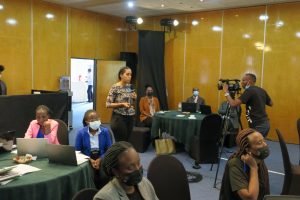
In his closing remarks the GGGI Rwanda Country Representative Okechukwu Daniel Ogbonnaya applauded the government of Rwanda and all the partners that are working towards the transition to electric mobility in Rwanda, he reiterated “GGGI’s commitment and support in Rwanda on the path of low-carbon development by scaling up e-mobility in all sectors and across all vehicle types. He added the critical importance of e-mobility in Rwanda will reduced GHG emission, create green jobs, increased access to sustainable services, improved air quality, and enhanced adaptation to climate change. Finally he said that e-mobility is also supporting Rwanda in reducing our reliance on imported fuel, which will create a more stable, self-sufficient economy as we move towards middle-income status. Such training workshops support a healthy ecosystem for e-mobility, with a supportive regulatory and policy-enabling environment. GGGI will continue to facilitate the transition to e-mobility as we continue to decouple economic growth from GHG emissions.